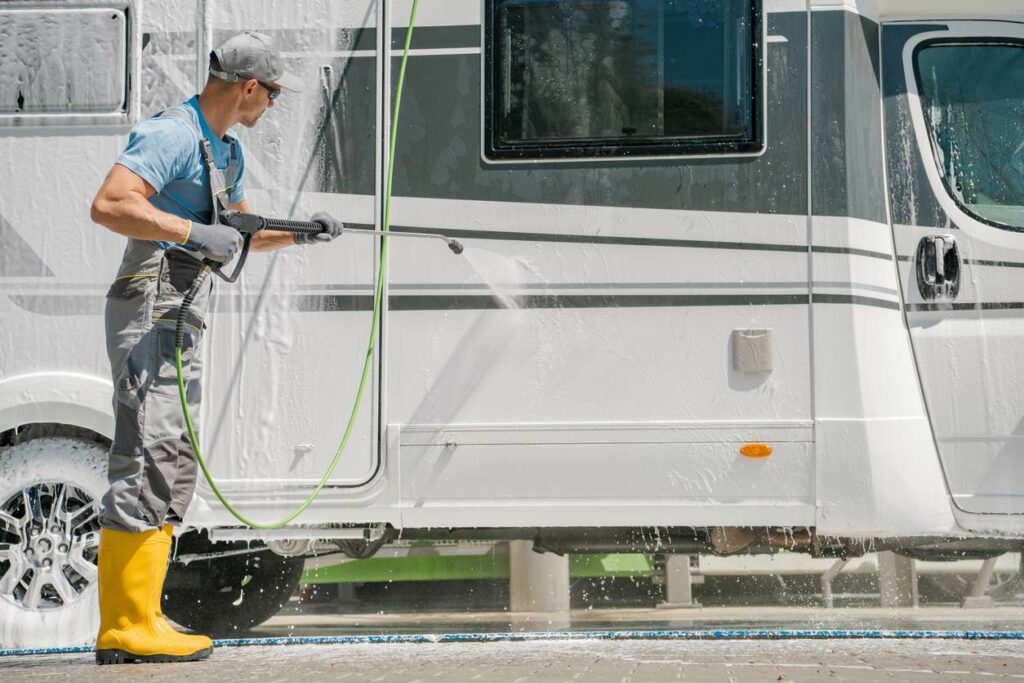If you own an RV in Fort Myers, you already know the annual concern that comes with the rainy season. Every year from May through October, you may have to face the same dilemma- how to protect your investment from months of relentless humidity, heavy rainfall, and potential storm damage.
The reality is stark. Fort Myers receives heavy rain, which is significantly more than the US average. Many RV owners discover too late that improper storage during this period can result in thousands of dollars in mold damage, rust, pest infestations, and deteriorated seals and mechanical systems.
That’s where you need to take the right step. Alternatives like RV storage solutions in Fort Myers can come in handy. Read this blog to learn about possible alternatives for RV owners.
Understanding Fort Myers’ Challenging Weather Patterns
The subtropical climate of Southwest Florida creates a perfect storm of conditions that threaten your RV’s integrity. During summer months, the weather is long, hot, oppressive, wet, and mostly cloudy. July often sees the heaviest precipitation.
This combination of high temperatures, excessive moisture, and prolonged humidity creates an environment where mold, mildew, and rust can flourish. Many RV owners learn this lesson the hard way when they discover thousands of dollars in damage after leaving their vehicle exposed to the elements.
Pre-Storage Deep Cleaning: Your First Line of Defense
Before even considering where to store your RV, thorough cleaning becomes critical. Start by removing all food items, including those hiding in forgotten corners and emergency supplies. Even the smallest crumb can attract pests during the humid months ahead.
Clean all surfaces with appropriate cleaners, paying special attention to the bathroom and kitchen areas where moisture tends to accumulate. Vacuum thoroughly, including under cushions and in storage compartments. This meticulous approach prevents organic matter from becoming a breeding ground for mold and bacteria during storage.
Don’t forget about your RV’s exterior. Wash and wax the entire vehicle, creating a protective barrier against the intense UV rays and acid rain common during Florida’s wet season.
Moisture Control: The Battle Against Humidity
Florida’s oppressive humidity can turn your RV’s interior into a petri dish for mold growth. Facilities for RV storage in Fort Myers understand this challenge and often provide climate-controlled environments, but you can take additional steps regardless of where you store your vehicle.
Install moisture absorbers throughout your RV’s interior. DampRid containers work well for small spaces, while electric dehumidifiers provide superior protection for larger areas. Place these strategically in bathrooms, bedrooms, and storage compartments where moisture typically accumulates.
Remove all fabric items that can harbor moisture, including bedding, towels, and clothing. Store these items in your home rather than leaving them in the humid RV environment.
Mechanical Systems Preparation
Your RV’s various systems require specific attention before storage. Begin with the plumbing system by completely draining all water lines, including the water heater and freshwater tank. Add RV antifreeze to prevent any remaining water from freezing during unexpected cold snaps.
Service your air conditioning system before storage. Clean or replace filters, and run the system for a few minutes to ensure proper operation. A well-maintained AC unit performs better when you retrieve your RV after the rainy season.
Check your RV’s battery system carefully. Remove batteries and store them in a cool, dry location, or connect them to a battery tender if storing at a facility with electrical access.
Protecting Your Investment with RV Storage
While some RV owners attempt to store their vehicles at home, Fort Myers’ brutal rainy season often proves this approach inadequate. RV storage facilities offer several advantages that become invaluable during these challenging months.
RV storage facilities in Fort Myers typically provide covered or enclosed options that shield your vehicle from direct rain exposure. These facilities also offer enhanced security features, including gated access, surveillance systems, and on-site management.
Many RV storage locations provide additional services like monthly inspections, battery maintenance, and even interior climate control. These services prove especially valuable during the extended wet season when problems can develop quickly in Florida’s harsh environment.
Choosing the Right Storage Solution
When selecting storage for your RV, consider several key factors. Location matters significantly – facilities closer to major highways provide easier access while maintaining security. Look for storage providers that offer flexible access hours, allowing you to check on your vehicle periodically.
Covered storage provides excellent protection from direct rainfall and UV damage, while fully enclosed storage offers maximum protection from humidity, pests, and theft. Some facilities even provide indoor climate-controlled environments that maintain optimal temperature and humidity levels year-round.
Consider facilities that offer additional amenities like wash stations. These conveniences save time and money while ensuring your RV remains in peak condition.
Pest Prevention Strategies
Florida’s warm, humid climate creates ideal conditions for various pests seeking shelter in stored RVs. Seal all exterior openings, including vents, exhaust pipes, and air conditioning units. Steel wool works effectively for larger gaps, while caulk handles smaller cracks.
Place mothballs or pest deterrent pouches throughout your RV’s interior, focusing on entry points and storage areas. However, ensure adequate ventilation when using these products, as concentrated fumes can damage interior materials.
Elevate your RV if possible, either through proper storage facility selection or by using leveling blocks. This elevation discourages rodents and insects from taking up residence underneath your vehicle.
Tire and Exterior Care
Fort Myers’ intense heat and UV exposure can cause significant tire degradation during storage. Inflate tires to manufacturer specifications before storage, and consider using tire covers to prevent UV damage and flat-spotting.
If storing outdoors, invest in a high-quality RV cover designed for your specific model. Ensure the cover fits properly and includes ventilation to prevent moisture buildup underneath.
Apply protectant to all rubber seals, awnings, and exterior trim. This maintenance prevents cracking and deterioration caused by Florida’s harsh sun and frequent temperature fluctuations.
Preparing for Retrieval
As Fort Myers’ rainy season winds down around mid-October, begin preparing your RV for retrieval. Schedule any necessary maintenance services in advance, as many RV service centers experience high demand as owners prepare their vehicles for winter use.
Plan a thorough inspection before your first post-storage trip. Check all systems, replace filters, and verify that moisture control measures were effective. This proactive approach prevents minor issues from becoming major problems during your next adventure.
Final Thoughts: Making the Smart Choice
Fort Myers’ rainy season doesn’t have to mean anxiety about your RV’s condition. With proper preparation and smart storage choices, you can protect your investment while enjoying peace of mind throughout the wettest months of the year.
RV storage facilities specializing in recreational vehicles understand the unique challenges of Florida’s climate. They provide solutions designed specifically for these conditions, offering protection that home storage simply cannot match.
Your RV represents freedom, adventure, and a significant financial investment. Don’t let Fort Myers’ rainy season compromise any of these valuable aspects. Take action now to ensure your recreational vehicle emerges from storage in perfect condition, ready for your next adventure when the pleasant winter weather returns to Southwest Florida.







